Plantation economy in the country is facing many headwinds, such as crashing pepper prices, stagnating prices of coffee and increasing cost of cultivation due to higher labor and input prices. Institutional innovations that can provide access to quality cheaper inputs and continuous capacity development are needed to help farmers wade through this crisis. In this Good Practice Note Saju George and B Prabhakar illustrate how ICAR-KVK Kodagu is supporting farmers through mentoring Farmer Producer Organisations to deal with these challenges
INTRODUCTION
The importance of mobilising farmers into groups is being increasingly recognised by farmers and policy makers in India. While earlier efforts focussed around organising producers into cooperatives, the current emphasis is on establishing Farmer Producer Organisations (FPOs). Over the past few years the National Bank for Agriculture and Rural Development (NABARD) and the Small Farmers Agribusiness Consortium (SFAC) have supported the organisation of FPOs, and have created a special fund called the ‘Producer Organisation Development Fund (PODF) and Produce Fund’ for this. In Karnataka State itself, NABARD has promoted about 197 FPOs with total farmer membership of more than 67,000 members under its Produce Fund (https://nabfpo.in).
PUTHARI FARMERS PRODUCER COMPANY LIMITED (PFPCL)
Karnataka State accounts for 85 per cent of the coffee crop in India with the remainder coming from Kerala and Tamil Nadu. In Karnataka, Kodagu, Hassan and Chikkamagaluru are the major coffee growing districts. Kodagu district is famous for the vast areas of coffee grown here in an eco-friendly way since decades (Box1).
The ICAR-Krishi Vigyan Kendra, Gonikoppal, Kodagu, hosted at the ICAR-Indian Institute of Horticultural Research, Bengaluru, has been promoting an FPC as the Producer Organisation Promoting institution (POPI) with support from NABARD since 2017, for the coffee, pepper and paddy farmers of Kodagu district. This FPC was registered as Puthari Farmers Producer Company Limited (PFPCL) under the Companies Act in December 2016 with 15 promoters. Farmers having record of rights, tenancy and crop information (RTC or Pahani) as proof, and growing any crop, were taken as members.
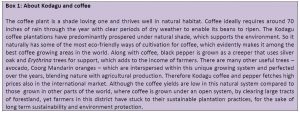
GOOD PRACTICES
Seeding the idea The ICAR-KVK, Kodagu, conducted a seminar on ‘Farmer Producer Organisations’ with the help of NABARD in September, 2016. After the seminar, a few like-minded, enterprising farmers and youth came forward to immediately put the idea into action. At that point the seeds were sown for the birth of Puthari FPC in December, 2016.
Registration
Initial founder members contributed INR 5000/person as share capital and the process for registration of FPC was started under the Companies Act. Meanwhile KVK and NABARD-Kodagu tried to get NABARD funding under the Produce Fund of NABARD, and it materialised in March 2017. NABARD agreed to fund the FPO for two years under its Produce Fund. In the first year the number of shareholders was 173.
Staffing
With funding support from NABARD, the company recruited a Chief Executive Officer (CEO), and minimum manpower to start an office for the FPO. KVK provided office space inside the campus at Gonikoppal itself to have better coordination and to reduce initial expenses.
Interventions: Retailing
The company initially started with retailing of basic farm inputs such as most-used fungicides and insecticides, irrigation equipment, coffee picking mats, shadenets, etc., required by coffee and pepper growers. The FPO formally launched its first retail outlet in September 2017. It was a big success. The company, which started with 15 products in the beginning, today has about 3003 products in its kitty, catering to the needs of coffee, pepper and paddy farmers. With increasing membership along with the need to cater to the needs of far-flung members, the second retail outlet was started in Virajpet town on 22 August 2019. The company has achieved a turnover of INR 1.72 crores in its second year of operation, mainly through its retail business.
IMPACT
Membership
After seeing its progress, the membership of FPC started growing. Today, in September 2019, the membership stands at 489, which effectively translates into an acreage of more than 4800 acres, thus making it one of the largest farmer organisations in the area of plantation crops. With the addition of more members every month, the PFPCL is targeting a total membership of 1000 by December 2020. The organisational structure of PFPCL is given below (Figure 1).
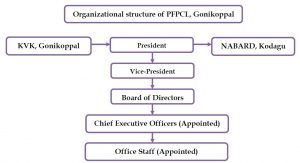 Figure 1: Organisational Structure of PFPCL, Gonikoppal
Figure 1: Organisational Structure of PFPCL, Gonikoppal
Market interventions
Together the members of PFPCL produce about 6000 tonnes of Robusta Coffee Cherry in one year. The FPC has also started initiatives in aggregation of farm produce, for the difficult to-market products like avocado, which was always fetch very low prices for farmers due to its short shelf life. Marketing of avocado was initiated through a tie-up with a private company, Farm Folks, Mysuru, in the beginning, and later by tying up with various retail chains. Moreover, farm inputs supplied to farmers are at much cheaper rate than in the market, as the FPC charges only minimal administrative costs and margin. There was always a problem for farmers in procurement of bulk farm inputs, such as dolomite and lime, which are basic farm inputs for any plantation crop. The FPC brought in a supply of such certified bulk inputs to the farmers’ doorsteps, thereby eliminating a major headache for farmers on the quality and content of lime and dolomite. Just in lime and dolomite itself, farmers started saving about INR 2000/acre because of the intervention of the FPC.
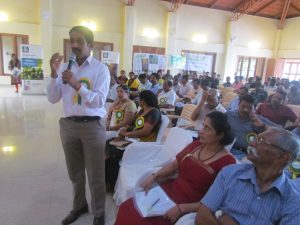 Puthari FPO member in Sankalp Se Sidhi programme
Puthari FPO member in Sankalp Se Sidhi programme
Capacity Development
Apart from retailing, the FPO has also focussed on providing regular training programmes to its members and handholding of young farmers, in order to guide them towards standardized scientific farming practices. Many educated young farmers are coming back to farming and for them this kind of an FPC provides vital support in their initial years of struggle with farming. They are found to be
the most enthusiastic takers for capacity building programmes conducted by the KVK. The capacity building programmes focus on bringing uniformity in the package of practices followed by farmers, which will later help the FPC in the marketing of member produce, particularly coffee. This is because international buyers prefer to buy a produce where there is uniformity in production practices, and the origin of the produce can be traced back to the estate.
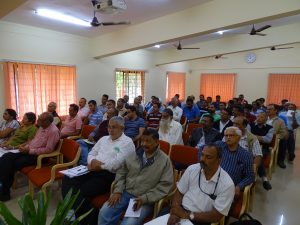 Capacity building training programme on sustainable coffee production
Capacity building training programme on sustainable coffee production
Reducing cost of cultivation and enhanced adoption of technologies
The cost of cultivation has been brought down by 15 to 20 per cent for farmers through supply of quality cheaper inputs. This was the first major impact created by the FPC that attracted new member farmers to the FPC. The inputs to be put up on the shelf are decided by a team of KVK scientists and experienced farmers.
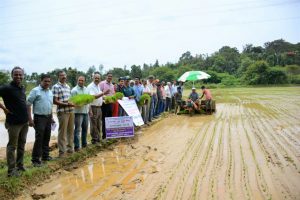 Promoting paddy transplanting
Promoting paddy transplanting
There is a separate retail team in the Board of Directors (BOD) who takes the final decision based on the inputs from the scientists. The number of applications of plant protection chemicals also has been streamlined. This has resulted in better control of pests and diseases in coffee, pepper and paddy, which are the major causes of loss for farmers.
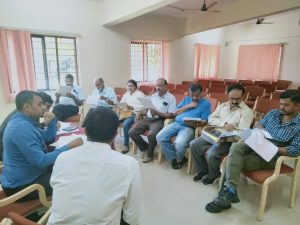 Board of Directors meeting
Board of Directors meeting
FUTURE ROADMAP FOR PFPCL
Kodagu’s plantation economy is going through a crisis (Box 2).The FPC is committed to providing support mechanisms for keeping this eco-friendly practice of cultivation, and giving the farmers a higher price for their eco-friendly coffee along with looking at options to reduce the cost of cultivation. With regard to labour scarcity the organisation is working on options for adopting mechanisation wherever possible, and pooling labour resources for labour-intensive work, such as weeding, harvesting, pruning, etc.
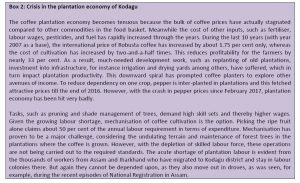
The PFPCL is also preparing a roadmap for entering into coffee and pepper marketing of its members, so as to provide member farmers with a higher share of the consumer’s price and thus contributing towards higher income for farmers. Coffee marketing is very complex and requires a great amount of funding. It has test-marketed its own brand of coffee powder in some of the melas organised by NABARD and has been well-received by the consumer. But the processing needs to be scaled up through investment, which the Board of Directors is seriously looking into. The PFPCL is also actively deliberating on starting a rural mart where fellow farmers can sell their produce directly to consumers, as well as establish linkages with other FPOs in the country for mutual marketing of their produce.
LESSONS
Importance of continuous capacity building
PFPCL members recognise the need for continuous capacity building and it is working in close collaboration with KVK, Coffee Board, Spices Board, etc., for its members.
Handholding by the KVK
The KVK has been playing a major role in PFPCL – through its two-and-a-half year journey – from the birth of PFPCL to its nurturing and on to its maturity as a self-sustaining organisation with 500 members. The KVK has been supporting the PFPCL through regular capacity building programmes for its members, training for its Board of Directors, exposure visits to different FPOs and progressive farmers’ fields, member mobilisation, etc. KVK has catered to several needs of FPO members, such as arranging need-based agro-advisory for FPO members through other research institutes located in the vicinity, like ICAR-IISR, Appangala, and Coffee Research Station, Chettalli. Apart from this the KVK has also been supporting PFPCL in its organisational development. KVK, along with NABARD, Kodagu, was involved in the registration of the company under the Companies Act, mobilisation of farmers, appointment of office bearers, business planning and networking, and exposure to new technological products for in-house production.
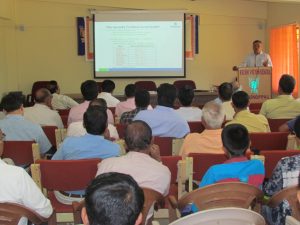 Training programme on balanced fertilizer application
Training programme on balanced fertilizer application
Establishing linkages with other institutions
PFPCL has developed a working relationship with the Coffee Board of India. PFPCL was invited to a Coffee Board meeting for developing a ‘Roadmap for Indian Coffee’ at Bengaluru, wherein the Coffee Board Chairman, Secretary, and the Director of the Coffee Research Institute were present. There the concept of handholding by the Coffee Board was discussed. Through a tie-up with the Coffee Board of India, PFPCL has been given access to the research labs of Coffee Board along with scientists, industrial relations team, and the head of Coffee Board. PFPCL is the first FPO in the country to be a member of ICTA (Indian Coffee Traders Association).
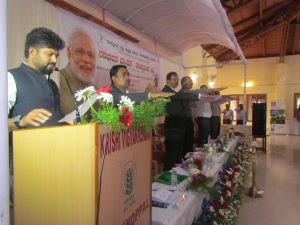 Honorable Mysore Kodagu MP Shri Pratap Simha addressing the Coffee growers at KVK Gonikoppal
Honorable Mysore Kodagu MP Shri Pratap Simha addressing the Coffee growers at KVK Gonikoppal
With this the PFPCL is preparing a roadmap to purchase its members’ coffee and export it globally with handholding from the Coffee Board of India. If all goes as planned, PFPCL will be the first FPO in India to have designed a coffee powder blend and market it under its own brand with the Coffee Board of India’s ‘Seal’of approval. With support from the Coffee Board, PFPCL will be able to market its produce to Air India, Indian Railways, Ministry of Defence, and other major retailers with whom the Coffee Board of India is working. PFPCL is also working with the Coffee Board of India to learn modern quality control and processing techniques of coffee beans. Two from the Board Directors of PFPCL was sponsored by KVK with NABARD assistance for a two-week training on quality coffee processing and coffee tasting at Coffee Board’s Bengaluru office.
ENDNOTE
The PFPCL so far has been able to generate enough interest within the farming community. Initially when the FPC was being set up there was considerable hesitation among many farmers. But slowly over the years, the PFPCL has been able to develop confidence among its members. The members are earnestly supporting and encouraging the Board of Directors of their company in all their endeavours for entry into newer areas, and lastly they are all looking forward to the day when they can sell their coffee under their own brand.

Saju George is Principal Scientist and Head, ICAR-KVK (IIHR), Gonikoppal, Kodagu (Email: Saju.George@icar.gov.in)

B. Prabhakar is SMS (Horticulture), KVK, Kodagu (Email:iihrkvkgk@gmail.com)

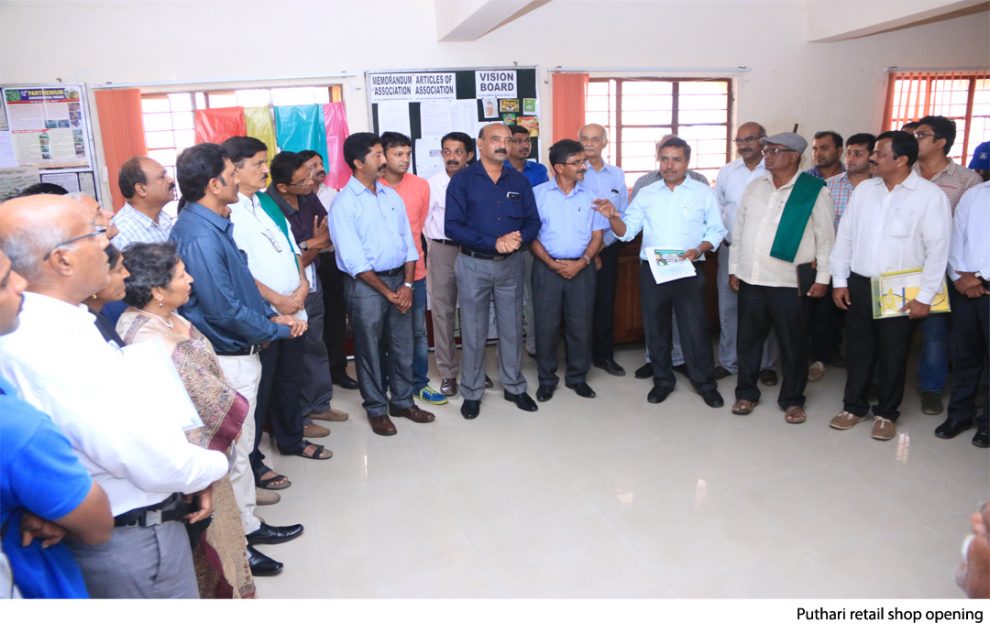

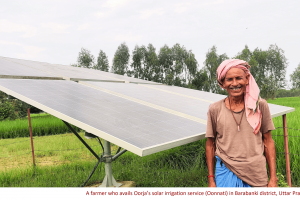
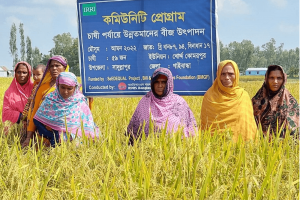
Very good effort by KVK Gonikoppa. It’s indeed a model to be emulated by other plantation-based farming community where farmers tend to come together and benefit from the FPO.
Very good work done by the KVK. Keep it up.